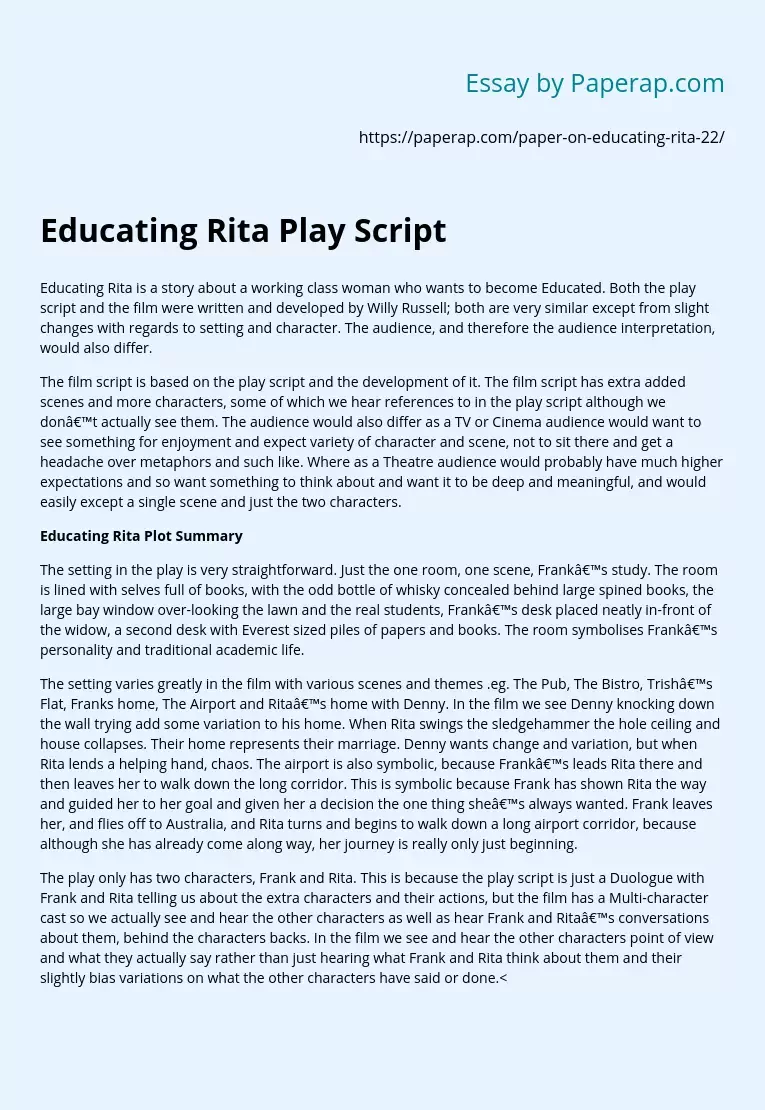Educating Rita Play Script
Educating Rita is a story about a working class woman who wants to become Educated. Both the play script and the film were written and developed by Willy Russell; both are very similar except from slight changes with regards to setting and character. The audience, and therefore the audience interpretation, would also differ.
The film script is based on the play script and the development of it. The film script has extra added scenes and more characters, some of which we hear references to in the play script although we don’t actually see them.
The audience would also differ as a TV or Cinema audience would want to see something for enjoyment and expect variety of character and scene, not to sit there and get a headache over metaphors and such like. Where as a Theatre audience would probably have much higher expectations and so want something to think about and want it to be deep and meaningful, and would easily except a single scene and just the two characters.
Educating Rita Plot Summary
The setting in the play is very straightforward. Just the one room, one scene, Frank’s study. The room is lined with selves full of books, with the odd bottle of whisky concealed behind large spined books, the large bay window over-looking the lawn and the real students, Frank’s desk placed neatly in-front of the widow, a second desk with Everest sized piles of papers and books. The room symbolises Frank’s personality and traditional academic life.
The setting varies greatly in the film with various scenes and themes .eg. The Pub, The Bistro, Trish’s Flat, Franks home, The Airport and Rita’s home with Denny. In the film we see Denny knocking down the wall trying add some variation to his home. When Rita swings the sledgehammer the hole ceiling and house collapses. Their home represents their marriage. Denny wants change and variation, but when Rita lends a helping hand, chaos. The airport is also symbolic, because Frank’s leads Rita there and then leaves her to walk down the long corridor. This is symbolic because Frank has shown Rita the way and guided her to her goal and given her a decision the one thing she’s always wanted. Frank leaves her, and flies off to Australia, and Rita turns and begins to walk down a long airport corridor, because although she has already come along way, her journey is really only just beginning.
The play only has two characters, Frank and Rita. This is because the play script is just a Duologue with Frank and Rita telling us about the extra characters and their actions, but the film has a Multi-character cast so we actually see and hear the other characters as well as hear Frank and Rita’s conversations about them, behind the characters backs. In the film we see and hear the other characters point of view and what they actually say rather than just hearing what Frank and Rita think about them and their slightly bias variations on what the other characters have said or done.
Frank is disillusioned because he’s a failed poet and never reached his goal or got were he wanted to be, so he has lost heart in education and the things he stands for. But Rita thinks his poetry is good and should be published, maybe Frank doesn’t want himself to be successful because he doesn’t think that he deserves it, but someone like Rita does, that’s why teaching Rita has opened his eyes a little and reminded him of the way that learning something new and using what you’ve learnt can make you feel. He doesn’t want to turn Rita into another stereotypical graduate because he wants her to retain her individuality because she will gain more with her uniqueness than with a false cliched identity.
Rita thinks she wants the false cliched identity but wants Franks guidance. She has a great thirst for knowledge and wants to know all but doesn’t want to have to wait for it. When we first meet Rita she talks with a strong Liverpool accent. This is represented in the play script by phonetic spellings and letters being replaced by apostrophes .ie.
“It’s stupid that bleedin’ door handle. You wanna get that fixed.” Accents can emphasise class and intelligence, so at first Rita we assume to be of a lower class than Frank and of less intelligence without even being told so. Later on, when Rita meets Trish her accent changes. She attempts to sound posh and with a less region accent .ie.
“I know, Frank. I’m terribly sorry. It was unavoidable.” She changed because Trish said that it was “not a lot of point discussing beautiful in an ugly voice.” But she can’t retain her voice showing that she can’t retain this false identity and her uniqueness is stronger and still shines through.
In conclusion I think that the film was a very successful interpretation of the play. The extra scenes and characters made the story easier to follow so you could concentrate more on what Willy Russell was really trying to say. This was accomplished because Willy Russell wrote the script for the film as well as the play so someone else couldn’t misinterpret it and the film said what he wanted it to say.
Educating Rita Play Script. (2019, Dec 05). Retrieved from https://paperap.com/paper-on-educating-rita-22/

